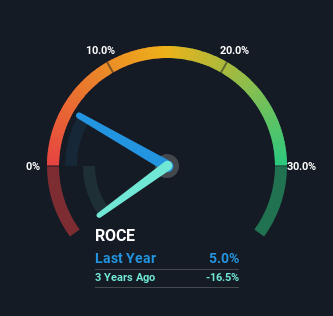- United States
- /
- Specialty Stores
- /
- NYSE:BNED
Barnes & Noble Education's (NYSE:BNED) Returns On Capital Are Heading Higher

If you're looking for a multi-bagger, there's a few things to keep an eye out for. One common approach is to try and find a company with returns on capital employed (ROCE) that are increasing, in conjunction with a growing amount of capital employed. Basically this means that a company has profitable initiatives that it can continue to reinvest in, which is a trait of a compounding machine. So on that note, Barnes & Noble Education (NYSE:BNED) looks quite promising in regards to its trends of return on capital.
Understanding Return On Capital Employed (ROCE)
If you haven't worked with ROCE before, it measures the 'return' (pre-tax profit) a company generates from capital employed in its business. The formula for this calculation on Barnes & Noble Education is:
Return on Capital Employed = Earnings Before Interest and Tax (EBIT) ÷ (Total Assets - Current Liabilities)
0.05 = US$26m ÷ (US$1.1b - US$524m) (Based on the trailing twelve months to October 2024).
So, Barnes & Noble Education has an ROCE of 5.0%. In absolute terms, that's a low return and it also under-performs the Specialty Retail industry average of 13%.
Check out our latest analysis for Barnes & Noble Education

Historical performance is a great place to start when researching a stock so above you can see the gauge for Barnes & Noble Education's ROCE against it's prior returns. If you're interested in investigating Barnes & Noble Education's past further, check out this free graph covering Barnes & Noble Education's past earnings, revenue and cash flow.
So How Is Barnes & Noble Education's ROCE Trending?
Even though ROCE is still low in absolute terms, it's good to see it's heading in the right direction. The figures show that over the last five years, returns on capital have grown by 56%. The company is now earning US$0.05 per dollar of capital employed. Interestingly, the business may be becoming more efficient because it's applying 23% less capital than it was five years ago. If this trend continues, the business might be getting more efficient but it's shrinking in terms of total assets.
Another thing to note, Barnes & Noble Education has a high ratio of current liabilities to total assets of 50%. This can bring about some risks because the company is basically operating with a rather large reliance on its suppliers or other sorts of short-term creditors. While it's not necessarily a bad thing, it can be beneficial if this ratio is lower.
The Bottom Line On Barnes & Noble Education's ROCE
In a nutshell, we're pleased to see that Barnes & Noble Education has been able to generate higher returns from less capital. And since the stock has dived 97% over the last five years, there may be other factors affecting the company's prospects. Still, it's worth doing some further research to see if the trends will continue into the future.
One more thing: We've identified 4 warning signs with Barnes & Noble Education (at least 3 which are significant) , and understanding these would certainly be useful.
For those who like to invest in solid companies, check out this free list of companies with solid balance sheets and high returns on equity.
Valuation is complex, but we're here to simplify it.
Discover if Barnes & Noble Education might be undervalued or overvalued with our detailed analysis, featuring fair value estimates, potential risks, dividends, insider trades, and its financial condition.
Access Free AnalysisHave feedback on this article? Concerned about the content? Get in touch with us directly. Alternatively, email editorial-team (at) simplywallst.com.
This article by Simply Wall St is general in nature. We provide commentary based on historical data and analyst forecasts only using an unbiased methodology and our articles are not intended to be financial advice. It does not constitute a recommendation to buy or sell any stock, and does not take account of your objectives, or your financial situation. We aim to bring you long-term focused analysis driven by fundamental data. Note that our analysis may not factor in the latest price-sensitive company announcements or qualitative material. Simply Wall St has no position in any stocks mentioned.
About NYSE:BNED
Barnes & Noble Education
Operates bookstores for college and university campuses, and K-12 institutions primarily in the United States.
Low and slightly overvalued.
Similar Companies
Market Insights
Community Narratives


